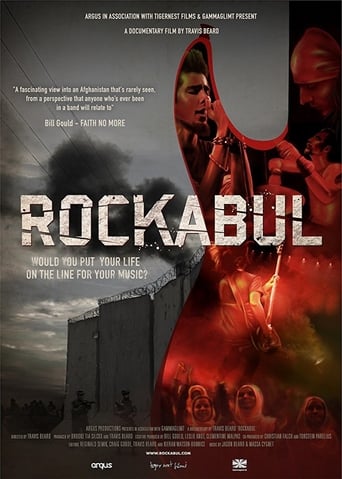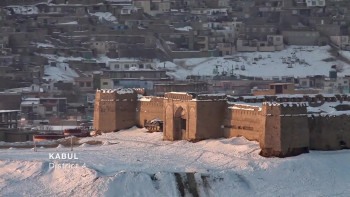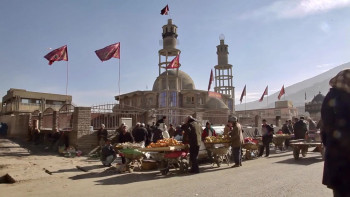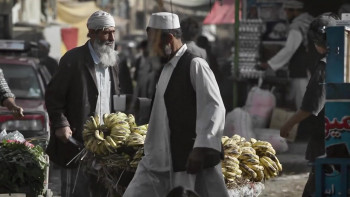Synopsis
Rockabul chronicles a unique and brave story by Australian journalist / filmmaker Travis Beard who put his life on the line to show a part of Afghan culture that is rarely represented in Western Media. Rockabul digs much deeper than the news headlines about conflict in Afghanistan as it looks into the complex terrain of daily life, the real life stories and experiences of the local community and generational change. The documentary follows the birth, rise and fall of Afghan Heavy Metal Music on the front-line of one of the longest wars. It is through music that the Afghan youth find positivity, meaning and hope in a devastated nation.After 9/11 troop battles raged on the frontline of Afghanistan but the capital Kabul itself was awash with expats looking for entrepreneurial ways to spend development money offered by the Americans and their allies including Australia. The investments were to fight conflict with culture and provide foreign aid in an attempt to rebuild the decimated nation. Australian Director, Travis Beard originally went to Afghanistan to volunteer as a journalist and to teach photojournalism to the locals. While there he got the 'Afghan Bug', stumbled upon a seed of a creative scene and decided to harvest it. In doing so, he provided hope to the Afghan youth through activities such as skateboarding, graffiti and alternative music. He saw potential in the band District Unknown (DU) and took the opportunity to manage Afghanistan's first heavy metal band. Qasem, Pedram, Qais, Lemar and eventually Yosef are members of DU and are full of optimism and teenage hubris much like any other ambitious group of young men from the West. The difference is, their nation is one at war and the difficulties that they face come with extra costs and risks.The journey begins with the first shaky shots of the band discovering rock music with guidance from Travis. Rehearsals are a little different to those bands in the West may experience as the power cuts out mid recording session as bombs go off around them. As their rock personas grow and their fan base moves from the hedonistic expat party scene to hordes of music-hungry young Afghans, the band's confidence in their rebellious message comes into question. Gaining notoriety means that they become a direct target for the Taliban. They begin to wear masks in an attempt to hide their identity on stage but the attention starts to spook them as they realise that their lives are at risk. In fear, Lemar, the frontman of the band seeks refugee status in Turkey with his soon to be wife. With help from their mentor Travis, the band regroups and finds another frontman Yosuf, who gives the band a much needed boost of fresh blood after the loss of their original front man.It is with the new front man Yosuf that we see District Unknown reach international status through performances in India SAARC Festival which were covered by Rolling Stone magazine and interviews across other prestigious media platforms. Elated, the boys feel that this band is really building into something bigger than their wildest dreams. We see, that Afghanistan is having a musical renaissance of sorts as numerous bands start to sprout up. We see the positive effect this has on the entire community of Afghanistan, particularly the female community.Once back in Afghanistan the band leaves the capital's safety bubble, [fondly known as the 'Kabubble'] and beyond the wire' to the wild eastern city of Mazar-e-Sharif. Travis organises their first ever concert 'beyond the wire' in a truck so that it is mobile enough to avoid attacks from the Taliban. The experiment is met with a mixture of reactions from the locals, police and religious authorities. Yosuf is arrested and the band chooses to go underground, as their country's security declines to unprecedented levels.Threats against the band increase, their flamboyant performances on stage are rapidly replaced with sombre round-table discussions about their future and their safety. Meanwhile, Travis watches as his dream of using music as a language for building a bridge between the West and Afghanistan crumbles around him. The shaky ground of Afghanistan slowly but sure opens up to reveal a vertiginous lack of foundation. We see the band members all seek refugee status to get out of Afghanistan as they see that they are no longer safe. It is a year later that a performance venue the band played at is blown up by the Taliban for 'insulting Islamic values' and to help enlist people and promote suicide bombings.The band members ultimately all end up being provided refugee status. Lemar is currently in Australia with his wife, he is a security guard at a casino in Cairns. After a twenty month visa application Qais joined his wife in Los Angeles and is studying to be an actor. Qasem, who was the last member of the band to leave Afghanistan obtained a student visa on his third attempt to study interior design in Washington, DC. On his first visa application, Joseph was successfully accepted to study computer science in Newcastle, UK. Pedram completed a Fullbright Scholarship in civil engineering, married an American girl and lives in Michigan, US.The film features never before seen footage of Kabul and the underground party scene, at odds with an extremely conservative society that chooses to turn a blind eye, so they can benefit from the flow of aid money propping up their economy.Afghanistan is known as the graveyard of empires. This film offers an honest insight into the reality of foreign policy, in a nation that has hosted and buried most of history's conquerors. It shows how hope and optimism offered a genuine escape for some Afghans, at the peak of foreign intervention, but also reveals their frustrations, because in a country like Afghanistan, nothing is guaranteed. It is a unique insight for Australian audiences into the real cost of war in a country Australia currently has troops deployed in and demonstrates the similarities and the differences of young men across cultures with hopes and dreams of rock stardom.






